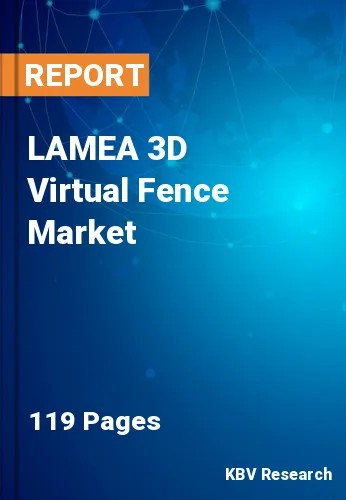The Latin America, Middle East and Africa 3D Virtual Fence Market would witness market growth of 24.1% CAGR during the forecast period (2023-2030).
For border security and surveillance, 3D virtual fences help monitor the ground, airspace, and underground tunnels, providing comprehensive coverage. Conservation efforts benefit from these fences to protect wildlife in three-dimensional spaces, such as in the air or underwater, from poaching or other threats. In space exploration, these fences could define boundaries for spacecraft and space stations, ensuring safe operations in outer space. In healthcare, these fences could be applied to guide surgical robots within the human body, helping to ensure precise and safe procedures. For large events, these fences could assist in crowd management by defining spatial boundaries and alerting authorities when those boundaries are breached. The expansion of the market would likely depend on advancements in technologies like GPS, LiDAR, radar, and sensors, as well as regulatory frameworks for defining and enforcing three-dimensional boundaries. For any market to grow, there must be a demonstrated need for technology, cost-effective solutions, and acceptance by relevant industries and regulatory bodies.
Widespread adoption requires education and training for users and operators. Users need to understand how to set up and utilize 3D virtual fences effectively. Educational efforts can come from technology providers, industry associations, and training programs. Machine learning and artificial intelligence have been increasingly incorporated into virtual fence systems. These technologies can help identify anomalies, predict breaches, and enhance virtual fences' overall effectiveness. The Internet of Things (IoT) has played a significant role in virtual fence technology. IoT devices and sensors communicate data and alerts, allowing remote monitoring and management. Virtual fence solutions are becoming more customizable and scalable to meet the specific needs of different industries and applications. As the adoption of virtual fence technology increases, regulatory bodies develop guidelines and standards to ensure safe and responsible use, which influences market trends.
The UAE's drive towards smart cities and the Internet of Things (IoT) can benefit from remote monitoring by integrating 3D virtual fence systems with other IoT devices and sensors for comprehensive security. Remote monitoring allows for efficiently managing multiple 3D virtual fence systems across different locations and facilities in the UAE. Security teams can oversee and respond to security incidents at various sites from a centralized location. With its rapidly growing infrastructure and security needs, the UAE can benefit significantly from implementing remote monitoring solutions for 3D virtual fences. Remote monitoring is a critical aspect of 3D virtual fence systems in the UAE region, as it enables continuous surveillance and real-time response to security threats.
The Brazil market dominated the LAMEA 3D Virtual Fence Market, by Country in 2022, and would continue to be a dominant market till 2030; thereby, achieving a market value of $147.9 Million by 2030. The Argentina market is registering a CAGR of 24.8% during (2023 - 2030). Additionally, The UAE market would showcase a CAGR of 23.8% during (2023 - 2030).
Based on Technology, the market is segmented into Seismic Detector Technology, Laser Beam Technology, Laser Systems Integration, and Others. Based on End-user, the market is segmented into Agriculture, Security, Logistics, Construction, BFSI, and Others. Based on Type, the market is segmented into 3D Virtual Cameras, and 3D Video Motion Detection System. Based on countries, the market is segmented into Brazil, Argentina, UAE, Saudi Arabia, South Africa, Nigeria, and Rest of LAMEA.
Free Valuable Insights: The Worldwide 3D Virtual Fence Market is Projected to reach USD 8.2 Billion by 2030, at a CAGR of 21.9%
The market research report covers the analysis of key stake holders of the market. Key companies profiled in the report include Schneider Electric SE, Senstar Technologies Ltd., Anixter International Inc. (WESCO International, Inc.), Controp Precision Technologies Ltd., G&A Surveillance (Zycom Surveillance), Huper Laboratories Co., Ltd., Lips Corporation, CE Info Systems Ltd. (map my India), RBtec Inc. and Optex Co. Ltd. (Optex Group Co., Ltd.).
By Technology
By End-user
By Type
By Country
Our team of dedicated experts can provide you with attractive expansion opportunities for your business.

